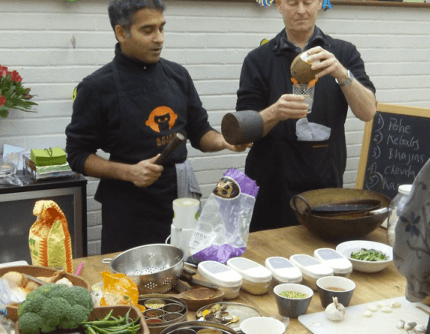British cry foul over shortage of trained curry chefs in the U.K.
Nikita Gulhane teaches Indian cooking at a small school he runs out of his home. (Photo by Laura Lynch.)
They call it Britain’s national dish. Curry is sold by more than 12,000 restaurants and takeout shops.
These days, though, there’s a problem in the nation’s curry houses. New tighter immigration rules have led to a shortage of chefs and a search for solutions.
A few days ago, the sounds of India filled a cavernous hall that sits on the south bank of the Thames, as a sitar player performed for a crowd of hundreds.
Women in glittering saris and men in tuxedos were given a red carpet welcome. Not given to understatement, organizers dubbed the gathering the Oscars of Britain’s vast curry industry.
There was no rubber chicken dinner served at the glitzy get-together. The menu featured chicken tikka masala.
It is a dish that was invented in British curry restaurants in the 1960s, after the industry took off, fueled by a wave of immigrants. Even Prime Minister David Cameron, who appeared via video, proved he knows his Indian cuisine.
“I’m sorry I can’t be with you tonight,” Cameron said. “Not just because I’m missing out on the chicken tikka masala I hear you’ve got on the menu.”
Cameron also took time to praise those who work in the industry, well aware of their growing economic influence.
“These awards aren’t just about quality food, they’re about quality people, people who work hard, who slog their guts out to make their businesses work.”
Cameron’s words may have rung hollow to some in the audience. His government has tightened immigration rules, making it almost impossible to hire chefs from India, Pakistan and Bangladesh.
The restrictions may be popular with the swelling ranks of the unemployed in Britain, but veteran curry restaurant owner Enam Ali told the crowd at the awards dinner the numbers don’t add up.
“There may be more than 2.5 million people out of work in Britain. But I guarantee that none of them are talented curry chefs,” Ali said.
Ali is not challenging the government directly, but he does have some concerns about the latest proposal to fix the curry chef shortage. The government is floating the idea of creating a curry college to train British people of all backgrounds to work in the industry.
Far away from the glamor of the awards night, some restaurant owners are openly worried.
At the Guglee Indian restaurant in north London, two men hovered over gas stoves in the basement kitchen. They stirred, scraped and blended in spices, scrambling to keep up with the orders.
It was the start of another busy evening. They would work flat out for the next six or seven hours.
Upstairs, owner Sachin Mulane smiled as he greeted two of his regulars. Business is good, he said, despite the country’s economic woes.
Mulane opened Guglee 17 months ago with his brother. They employ five cooks, but he said they needed at least three more, especially since they want to open a second branch.
He’s fed up.
“It is really, really frustrating,” Mulane said. “At times my chefs can’t even take a day off. And that is just because we cannot really find good chefs.”
Mulane believes the curry college proposal won’t help.
“I really don’t think that’s a very good idea,” he said. “To become an Indian chef you have to work really hard. It’s not like a one day, one year or two year job. It is an ongoing process and it should be within you for years. That’s where you become perfect. “
In years past, many curry houses were true family operations and cooks learned the craft at their parent’s side.
But younger generations are now more likely to seek an education and careers outside the kitchen. It is all happening at a time when interest in Indian cuisine in Britain seems to be growing.
Nikita Gulhane teaches Indian cooking at a small school he runs out of his home. Gulhane’s parents moved to London from India in 1936, but he was born here.
He said he’s signing up more and more students, but none are looking for a job in the industry because they see it only as a hobby. Gulhane too said a curry college will not solve the shortage.
“It is going to produce a problem, because a lot of these restaurant owners go to India because they know they can get staff. Maybe they’re friends of families or they know they can get these guys in. They’re going to come into a kitchen environment where everybody speaks the same language and these guys will work hard,” Gulhane said.
And Gulhane noted, they will work hard for very little pay, something he believes most British workers will not do.
